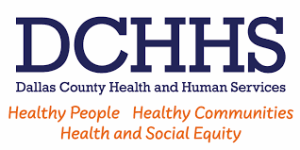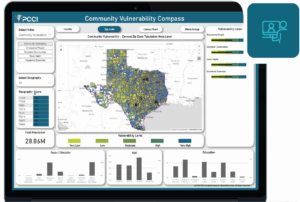
Vikas Chowdhry, PCCI’s CIO testified at the Texas State Capitol in front of the TX House Human Services Committee (chaired by Rep. James Frank) in support of House Bill 4343 sponsored by Representative Toni Rose (District 110). This bill will require HHSC to gather member contact preferences and gain their informed consent on the application, and then pass that consent to the Managed Care Organization (MCO), thus making it easier for MCOs to contact their members via their preferred electronic modes of communications such as texting.
PCCI has observed health outcomes greatly improve for Parkland Health Plan’s members through our pediatric asthma and pre-term birth prevention text messaging programs and we fully support this bill that will allow MCOs to expand programs like this.

(Rep. Toni Rose (center) with Kay Ghahremani, CEO of Texas Association of Community Health Plans and Vikas Chowdhry, CIO at PCCI)
Full text of testimony is follows:
HOUSE BILL 4343 (ROSE)
TESTIMONY OF VIKAS CHOWDHRY
Mr. Chairman, members, good morning (afternoon), my name is Vikas Chowdhry. I am the Chief Analytics and Information Officer for the Parkland Center for Clinical Innovation – PCCI – and I am testifying in support of House Bill 4343.
PCCI started as a department within Parkland Health and Hospital System and was spun out as an independent, not-for-profit organization in 2012 to not only serve the needs of Parkland, but to also pursue additional transformative initiatives that could have a broader impact. PCCI remains tightly connected to Parkland, the Parkland Foundation and the Parkland Community Health Plan. Our collaborative work focuses on the needs of vulnerable populations across North Texas and beyond. Our work focuses on cutting edge uses of AI, Non Medical Drivers of Health, and clinical expertise across clinical and community settings.
Representative Rose, thank you for filing this bill. Simply put, when a health plan is able to text its members, health outcomes improve. They can do this now, but (as you heard) MCOs are required to first call a member and ask for their consent. The problem is not having to seek the consent, which is entirely appropriate, but having to get the consent via a telephone call, because of course most people do not answer calls from numbers they don’t recognize. In Representative Rose’s committee substitute, HHSC is tasked with gathering member contact preferences and sending those preferences to the MCO. This should make it more likely that an MCO can contact a member via text.
Why is this beneficial? At PCCI, we have documented the positive impacts of programs involving the texting of members. In our Asthma program, we studied Parkland Community Health Plan members under the age of 18 who were enrolled in our text messaging program. Those in the study received 3-5 educational or reminder text messages per week, including 2-item Asthma symptoms surveys once or twice a week. We saw a 22.5% increase in asthma outpatient visits, and a six-fold drop in asthma-related visits to the emergency department. 84% of the respondents to our satisfaction survey said that the program has taught them to take better care of their child’s asthma
We performed similar research in our Preterm Birth Prevention Program. Pregnant women enrolled in the program received four to five messages per week.This study produced positive results as well, with a 24 percent increase in prenatal visit attendance, and a 27 percent drop in preterm birth rates. More than two-thirds of the respondents to our satisfaction survey said that as a result of this program, they feel better prepared to take care of themselves and their baby.
The analysis that we have shared above is based on pre-COVID data. Through COVID period, we observed an overall reduced impact on outcomes across all these groups but even within that period, members enrolled in text messaging program still had better outcomes compared to those not enrolled. So, just through something as simple as a few text messages, we saw better health outcomes and less expensive care. Texting works.
Mr. Chairman, Representative Rose, members, thank you for the opportunity to visit with you today. I’m happy to answer any questions.
===========================================================






